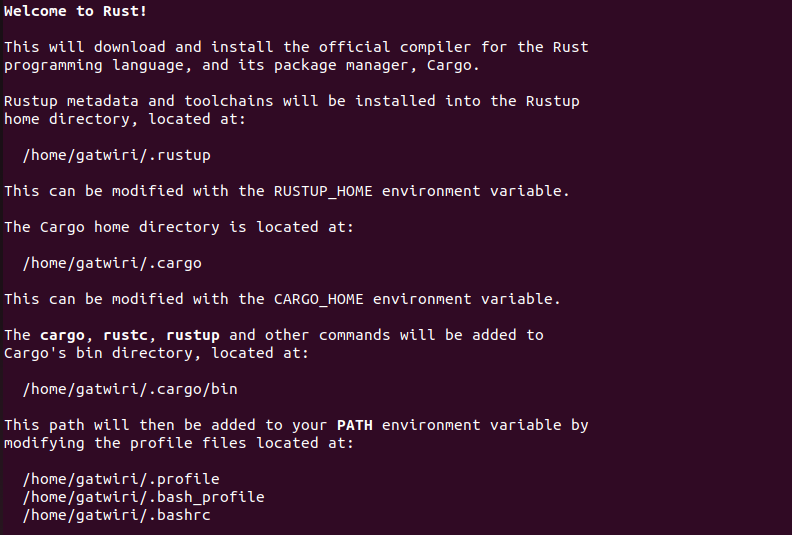How to Develop with Sui on Ubuntu – A Step-by-Step Environment Setup
 valentine Gatwiri
valentine Gatwiri
Getting started with blockchain development can be exciting and overwhelming, especially when exploring a new platform like Sui. As a beginner Sui developer, I’ve been diving into its capabilities and learning to set up a proper development environment. Sui is a high-performance blockchain designed for building scalable and secure decentralized applications (dApps). If you're like me, curious about web3 and eager to build on Sui, this guide will walk you through setting up Sui on Ubuntu, step by step.
Prerequisites
Before diving into the setup, ensure you have the following:
Ubuntu 20.04 or later (recommended for compatibility).
Basic familiarity with the command line.
A stable internet connection.
Fastest method: Quick installation using Homebrew
When setting up my development environment, I realized that managing software installations efficiently is crucial, especially when working with tools like Sui. Homebrew has been a game-changer for me!
It’s a lightweight and straightforward package manager that makes installing software on Ubuntu incredibly easy. Instead of manually configuring dependencies, you can install tools with a single command. Before using Homebrew, you should ensure it's installed on your system. To install Homebrew on Ubuntu, run the following command:
/bin/bash -c "$(curl -fsSL https://raw.githubusercontent.com/Homebrew/install/HEAD/install.sh)"
output:
==> Checking for `sudo` access (which may request your password)...
==> This script will install:
/home/linuxbrew/.linuxbrew/bin/brew
/home/linuxbrew/.linuxbrew/share/doc/homebrew
/home/linuxbrew/.linuxbrew/share/man/man1/brew.1
/home/linuxbrew/.linuxbrew/share/zsh/site-functions/_brew
/home/linuxbrew/.linuxbrew/etc/bash_completion.d/brew
/home/linuxbrew/.linuxbrew/Homebrew
Press RETURN/ENTER to continue or any other key to abort:
[sudo] password for gatwiri:
==> /usr/bin/sudo /bin/chown -R gatwiri:gatwiri /home/linuxbrew/.linuxbrew/Homebrew
==> Downloading and installing Homebrew...
==> Updating Homebrew...
After installation, add Homebrew to your shell profile:
echo 'eval "$(/home/linuxbrew/.linuxbrew/bin/brew shellenv)"' >> ~/.bashrc
eval "$(/home/linuxbrew/.linuxbrew/bin/brew shellenv)"
Alternatively, if you want to specify your home directory explicitly, use the command below:
echo 'eval "$(/home/linuxbrew/.linuxbrew/bin/brew shellenv)"' >> /home/your_username/.bashrc
eval "$(/home/linuxbrew/.linuxbrew/bin/brew shellenv)"
For Zsh use:
echo 'export PATH="$HOME/sui/target/release:$PATH"' >> ~/.zshrc
source ~/.zshrc
Adding Homebrew to your shell profile (e.g., ~/.bashrc, ~/.zshrc, or ~/.profile) ensures that you can run the brew command from any terminal session without needing to specify its full path.
After that, install Homebrew's dependencies:
sudo apt-get install build-essential
Installing Homebrew’s dependencies ensures that Homebrew and the software it manages work correctly on your system. Dependencies are essential libraries, tools, or system utilities that Homebrew requires to function efficiently. Now, verify the installation using brew doctor which will output Your system is ready to brew.
Now that Homebrew is installed, use the command below to install Sui, this helps by automating the process of downloading, configuring, and setting up the Sui blockchain environment on your system.
brew install sui
Once Sui is installed, verify the installation by checking the Sui version using sui --version which will output the installed version:
sui 1.45.2-homebrew
To install Sui via Homebrew, you do not have to download and compile it manually or set it up. Homebrew also automatically handles dependencies, installing whatever libraries or tools you need, such as Rust and Cargo, without your intervention.
It also provides you with the most recent stable version of Sui, and therefore, there is minimal risk of compatibility issues. Sui is easy to upgrade because you can do it using a single command (brew upgrade sui) or elegantly uninstall it (brew uninstall sui) when you no longer need it.
Installing Sui via Cargo (Rust)
If you prefer to install Sui using Cargo, Rust's package manager, you can build it from source for better control over the installation process. This method ensures you have the latest stable version directly from the repository.
Before proceeding, ensure that Rust and Cargo are installed on your system. The installation involves cloning the Sui repository, compiling the source code with Cargo, and setting up the necessary environment variables.
Update Your System
Before installing Sui via Cargo, you should update your system to ensure compatibility and smooth installation. To do so, open a terminal and run:
sudo apt update && sudo apt upgrade -y
Install Dependencies
Ensure that all required dependencies are installed. These dependencies include essential build tools, libraries, and system packages that enable successful compilation and execution. Use the following command to do so:
sudo apt install -y curl git build-essential pkg-config libssl-dev
Install Rust
Sui is built using Rust. To install Rust, use rustupThe Rust tool chain installer:
curl --proto '=https' --tlsv1.2 -sSf https://sh.rustup.rs | sh
Output:

Follow the on-screen instructions to complete the installation.
1) Proceed with standard installation (default - just press enter)
2) Customize installation
3) Cancel installation
Choose option 1: Proceed with standard installation by pressing Enter. Here's why:
Why Choose Standard Installation?
Easiest Option: The standard installation is pre-configured with the most common settings, making it the simplest choice for most users.
Recommended for Beginners: If you're new to Rust or Sui, the default settings will work perfectly for your development environment.
Saves Time: You don't need to manually configure anything, which is ideal for getting started quickly.
When to Choose Customized Installation?
Advanced Users: If you have specific requirements, such as installing Rust in a custom directory or configuring advanced settings.
Special Use Cases: For example, if you want to install additional components or modify the default installation path.
Output:
info: profile set to 'default'
info: default host triple is x86_64-unknown-linux-gnu
info: syncing channel updates for 'stable-x86_64-unknown-linux-gnu'
info: latest update on 2025-03-18, rust version 1.85.1 (4eb161250 2025-03-15)
info: downloading component 'rust-std' for 'wasm32-unknown-unknown'
19.3 MiB / 19.3 MiB (100 %) 4.5 MiB/s in 5s
info: downloading component 'cargo'
8.8 MiB / 8.8 MiB (100 %) 2.6 MiB/s in 3s
info: downloading component 'clippy'
info: downloading component 'rust-docs'
18.2 MiB / 18.2 MiB (100 %) 3.7 MiB/s in 5s
info: downloading component 'rust-std'
29.2 MiB / 29.2 MiB (100 %) 4.6 MiB/s in 7s
info: downloading component 'rustc'
69.5 MiB / 69.5 MiB (100 %) 4.5 MiB/s in 16s
info: downloading component 'rustfmt'
info: removing previous version of component 'rust-std' for 'wasm32-unknown-unknown'
info: removing previous version of component 'cargo'
info: removing previous version of component 'clippy'
info: removing previous version of component 'rust-docs'
info: removing previous version of component 'rust-std'
info: removing previous version of component 'rustc'
info: removing previous version of component 'rustfmt'
info: installing component 'rust-std' for 'wasm32-unknown-unknown'
19.3 MiB / 19.3 MiB (100 %) 10.7 MiB/s in 2s
info: installing component 'cargo'
info: installing component 'clippy'
info: installing component 'rust-docs'
18.2 MiB / 18.2 MiB (100 %) 577.6 KiB/s in 23s
info: installing component 'rust-std'
29.2 MiB / 29.2 MiB (100 %) 6.0 MiB/s in 9s
3 IO-ops / 3 IO-ops (100 %) 0 IOPS in 5s ETA: Unknown
info: installing component 'rustc'
69.5 MiB / 69.5 MiB (100 %) 8.0 MiB/s in 14s
info: installing component 'rustfmt'
info: default toolchain set to 'stable-x86_64-unknown-linux-gnu'
stable-x86_64-unknown-linux-gnu updated - rustc 1.85.1 (4eb161250 2025-03-15) (from rustc 1.71.1 (eb26296b5 2023-08-03))
Rust is installed now. Great!
To get started you may need to restart your current shell.
This would reload your PATH environment variable to include
Cargo's bin directory ($HOME/.cargo/bin).
To configure your current shell, you need to source
the corresponding env file under $HOME/.cargo.
This is usually done by running one of the following (note the leading DOT):
. "$HOME/.cargo/env" # For sh/bash/zsh/ash/dash/pdksh
source "$HOME/.cargo/env.fish" # For fish
source "$HOME/.cargo/env.nu" # For nushell
Add Rust to your PATH:
source $HOME/.cargo/env
Running this command ensures that cargo, rustc and other Rust tools are available in your terminal.
Verify the installation by checking the Rust version:
rustc --version
In my case, it’s rustc 1.85.1 (4eb161250 2025-03-15) that shows that Rust is installed.
Install Sui Directly From the Source
To install Sui binaries directly from the source using Cargo, use:
cargo install --locked --git https://github.com/MystenLabs/sui.git --branch devnet sui
In the above command, cargo install Installs a Rust package. --locked ensures Cargo.lock is respected for dependency consistency.--git https://github.com/MystenLabs/sui.git fetches the latest Sui source code from the GitHub repository.--branch devnet Installs the devnet version of Sui.
Output :
cargo install --locked --git https://github.com/MystenLabs/sui.git --branch devnet sui
Updating git repository `https://github.com/MystenLabs/sui.git`
Installing sui v1.46.0 (https://github.com/MystenLabs/sui.git?branch=devnet#70379f9c)
Updating crates.io index
Compiling proc-macro2 v1.0.94
Compiling unicode-ident v1.0.12
Compiling serde v1.0.217
Compiling libc v0.2.169
Compiling syn v1.0.107
Compiling autocfg v1.1.0
Compiling version_check v0.9.4
Compiling cfg-if v1.0.0
Compiling quote v1.0.37
Compiling syn v2.0.99
Compiling unicode-xid v0.2.4
Compiling getrandom v0.2.15
Compiling libm v0.2.6
Compiling num-traits v0.2.18
Compiling typenum v1.16.0
Compiling generic-array v0.14.7 ....
Install Sui From Source via Cloning
Cloning the Sui repository allows you to download the latest version of the code, including all branches and commit history. This method is useful if you want to contribute to development, build from the latest updates, or customize your installation. To do so, clone the Sui repository from GitHub:
git clone https://github.com/MystenLabs/sui.git
cd sui
Output
Cloning into 'sui'...
remote: Enumerating objects: 417358, done.
remote: Counting objects: 100% (7724/7724), done.
remote: Compressing objects: 100% (804/804), done.
remote: Total 417358 (delta 7375), reused 6950 (delta 6919), pack-reused 409634 (from 2)
Receiving objects: 100% (417358/417358), 360.76 MiB | 3.56 MiB/s, done.
Resolving deltas: 100% (283256/283256), done.
Updating files: 100% (14935/14935), done.
Build Sui from source using:
cargo build --release
Output
info: syncing channel updates for '1.85-x86_64-unknown-linux-gnu'
info: latest update on 2025-03-18, rust version 1.85.1 (4eb161250 2025-03-15)
info: downloading component 'cargo'
info: downloading component 'clippy'
info: downloading component 'rust-docs'
info: downloading component 'rust-std'
info: downloading component 'rustc'
info: downloading component 'rustfmt'
info: installing component 'cargo'
info: installing component 'clippy'
info: installing component 'rust-docs'
info: installing component 'rust-std'
info: installing component 'rustc'
info: installing component 'rustfmt'
Updating git repository `https://github.com/MystenLabs/fastcrypto`
Updating crates.io index
Updating git repository `https://github.com/mystenlabs/anemo.git`
This command compiles the Sui codebase. Be patient, as it may take some time.this will depend on several factors.Such as computer performance,Internet connection ,system specification e.t.c
When done, add Sui to your PATH for easy access:
export PATH=$PATH:$HOME/sui/target/release
Install Additional Tools
Sui relies on additional tools like cmake and protobuf-compiler. Install them using:
sudo apt install -y cmake protobuf-compiler
Verify the Sui Installation
Verify Sui is installed by typing sui In the terminal. The output should be as follows:
A Byzantine fault tolerant chain with low-latency finality and high throughput
Usage: sui <COMMAND>
Commands:
start Start a local network in two modes: saving state
between re-runs and not saving state
between re-runs. Please use (--help) to see the
full description.
network
genesis Bootstrap and initialize a new sui network
genesis-ceremony
keytool Sui keystore tool
client Client for interacting with the Sui network
validator A tool for validators and validator candidates
move Tool to build and test Move applications
bridge-committee-init Command to initialize the bridge committee, usually
used when running local bridge cluster
fire-drill Tool for Fire Drill
help Print this message or the help of the given
subcommand(s)
Options:
-h, --help Print help
-V, --version Print version
This confirms that Sui is set up and ready to use on your system. You can now start interacting with the Sui blockchain, run nodes, or develop smart contracts seamlessly.
Join the Sui Community
One of the things I love about Sui is its vibrant and welcoming community. As a beginner, connecting with other developers has been incredibly helpful in navigating the ecosystem. If you're looking to get involved, here are some great ways to engage:
Join the Sui Discord for support and collaboration.
Explore the Sui Documentation for detailed guides and tutorials.
Contribute to the Sui GitHub repository by reporting issues or submitting pull requests.
Troubleshooting
I’ve learned that setting up a development environment doesn’t always go smoothly—sometimes, things don’t work as expected. If you run into issues while setting up Sui, don’t worry! Here are some tips that have helped me troubleshoot problems:
Ensure all dependencies are installed correctly.
Update Rust to the latest version.
Check the Sui GitHub repository for open issues or discussions.
If you’re lost, don’t hesitate to contact the Sui community on Discord or forums. I’ve found that people are always willing to help!
Conclusion
By following this guide, you've successfully set up a fully functional Sui development environment on Ubuntu—congrats! 🎉 Now, you're ready to dive into building decentralized applications on Sui. Whether you're crafting your first smart contract, exploring Move programming, or experimenting with Sui’s unique features, there's so much to discover. I’m excited to be on this journey too, and I can’t wait to see what we build together! 🚀.
Happy coding!
Subscribe to my newsletter
Read articles from valentine Gatwiri directly inside your inbox. Subscribe to the newsletter, and don't miss out.
Written by
